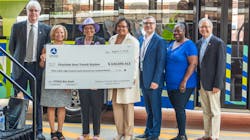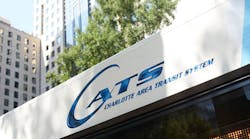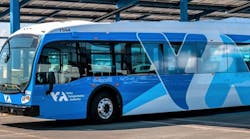CATS receives $30 million federal grant for sustainable fleet updates
The Charlotte Area Transit System (CATS) was presented with a $30 million grant by U.S. Congresswoman Alma Adams and Federal Transit Administration (FTA) Region 4 Regional Administrator Dr. Yvette G. Taylor and other dignitaries on Aug. 2. This grant is meant to help advance CATS' fleet electrification and workforce development programs. To date, this is one of the largest grants CATS have received from the FTA.
“Today marks a significant milestone not just for Charlotte, but for the entire region and for all those who depend on the Charlotte Area Transit System for work, school, entertainment or just their everyday life,” said Congresswoman Adams. “The role of the Federal Transportation Administration in bolstering our local municipalities is crucial. It's through the FTA's grant funding we're able to create more livable communities for our residents through infrastructure to enhance mobility. This substantial $30 million FTA grant will make a lasting impact on the Charlotte region for years to come.”
The grant funds are provided through the FTA’s 2023 Low or No Emission and Grants for Buses and Bus Facilities Competitive Program, which is funded by the Infrastructure Investment and Jobs Act. The federal resources are available to states and FTA direct recipient grantees to replace, rehabilitate and purchase buses and related equipment and to construct bus-related facilities, including technological changes or innovations to modify low or no emission vehicles or facilities.
“Today’s announcement is important because we are celebrating change that will be transformational for the city," Taylor said. “The Charlotte Area Transit System, under the leadership of Brent Cagle, we know will use this grant money to buy electric buses, battery electric and hybrid electric buses, charging equipment as well as upgrading bus facilities.”
CATS has worked to prioritize climate action since the late 2018 adoption of the city of Charlotte’s Strategic Energy Action Plan (SEAP). Several of its investments have included hiring a sustainability and resiliency officer, partnering with eTransEnergy, a subsidiary of Duke Energy, for its initial battery electric buses program, which also received funding from the FTA in 2020 through this same competitive grant program, beginning its zero-emission fleet on corridors with lower air quality and integrating sustainable development into its design practices through its continued pursuit of LEED and other comparable certifications. CATS is also in process on developing its first comprehensive Zero Emission Transition Plan, which should be finalized by the end of 2023.
“By investing in these advanced, low or no emission vehicles and equipment, we're ensuring everyone in the CATS service area reaps the benefits. The maintenance of these new buses will be performed by local workers, professionally trained in Charlotte within CATS,” said Mayor of Charlotte Vi Lyles. “This grant will also allow us to train certified electric vehicle technicians in our region, contributing to our economy in an industry poised for exponential growth by 2030.”
“CATS is working diligently on replacing its old, diesel buses. We are grateful to FTA for this award which will support our efforts to create a more sustainable, equitable, and efficient system for our community. We are also very grateful for the support of our Metropolitan Transit Commission and Charlotte City Council, our federal and state delegations, as well as our partners at Mecklenburg County and Centralina Council of Governments for their support of this application.” said Brent Cagle, Interim chief executive officer of CATS. “These efforts work to reinforce our mission to deliver high quality, affordable transit services that connect people, jobs and communities in the growing Charlotte region.”
The funding for this grant will specifically support the following activities:
- 15 battery electric buses and 16 hybrid electric-diesel buses
- 15 battery electric bus charging stations
- Natural gas generator, replacing an existing diesel generator to ensure continuity of operations
- Advancement of CATS workforce development and training program, eSERVE Academy
- Software upgrades to current yard management systems and tooling for electric vehicle repair and maintenance







